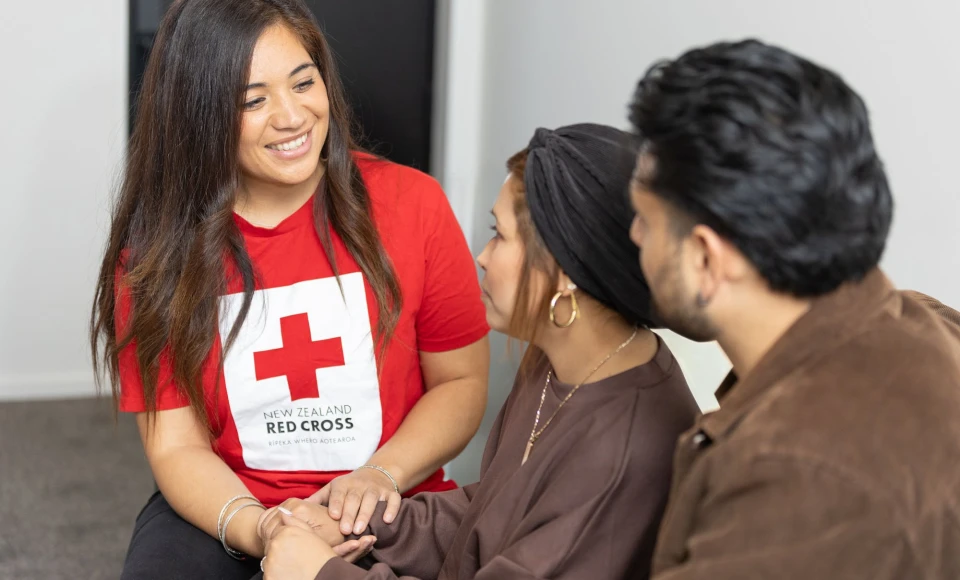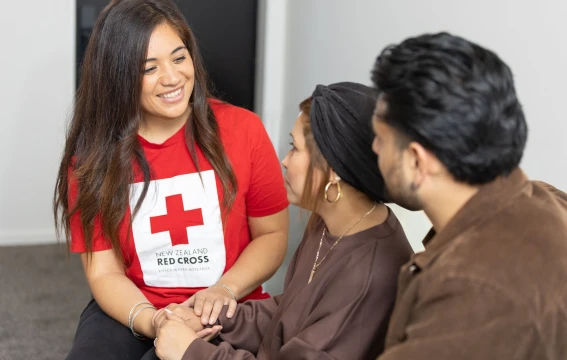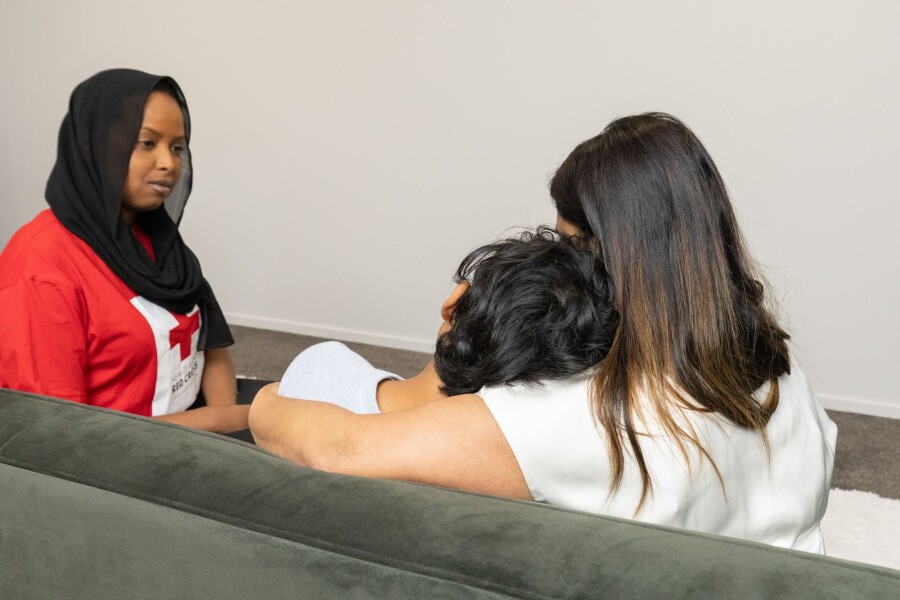Starting again in Aotearoa
21 November 2025


Imagine how you would cope if you were forced to start your life all over again. Starting from scratch in a foreign country, far away from friends and family, from familiar surroundings – and all in a language you can’t read or speak.
Around the world, people are forced to flee their homes due to escalating conflict and humanitarian crises. There are more than 43 million refugees globally. Yet each year, fewer than one percent of those refugees are given a chance to rebuild their lives in a new and safe country.
Families from conflict-affected countries like Ukraine, Afghanistan, Syria and more have faced unimaginable hardship. They are escaping persecution and violence, with many staying in refugee camps or travelling through one or multiple host countries to find safety. They then face the overwhelming task of rebuilding their lives piece by piece.
While their journeys can differ, sadly, that’s the daunting reality for many of the more than 800 former refugees from 20+ countries New Zealand Red Cross supports each year.
A new life in Wairarapa
For Harit and Farha*, who fled Kashmir after receiving death threats, arriving in New Zealand brought immense relief from the terrible ordeals they had gone through. Targeted for their religion, members of their community, and even family, suffered beatings, torture and death.
Fleeing in the dead of night with just a small suitcase each, they left their family, business and everything they knew behind. But their escape was just the beginning. It would take nearly eight years of living in limbo and fear before being accepted for resettlement in New Zealand. Harit and Farha, along with their two young daughters, arrived knowing very little about our country.
“I didn’t know anything about New Zealand…just that there was a cricket team.”
Harit
This is where the New Zealand Red Cross Pathways to Settlement programme steps in. For at least a year after arrival, our team of qualified staff and specially trained volunteers walk alongside former refugees, offering practical help and guidance so they can start to feel at home and build their lives with confidence.
We are there to welcome people into their new community. We help them settle into their new homes and show them things like how to catch a bus, open a bank account, enrol children in school and sign up with the local GP.
We also help with the bigger things that any of us could find difficult, such as finding employment and building meaningful friendships in a new community.
Many people from refugee backgrounds arrive having endured unimaginable trauma, including war, violence or torture. Through our Refugee Trauma Recovery programme, we are able to provide them with the mental health care they need or connect them with the right specialist services.
Now settled in the Wairarapa, Harit and Farha feel safe enough to tell their story – though we are keeping their details and names private due to real safety concerns for their family back in Kashmir.
Being part of a religious minority, Harit recalls members of his community being persecuted and even beaten since school age. Families would complain to the police, but things didn’t get better. Tragically, in 2006, members of his own family, his uncle and aunt, were murdered.

Our Pathways to Settlement team help support more than 800 former refugees every year
Around the world, through no fault of their own, innocent people experience unimaginable discrimination and violence, simply because of who they are and where they live.
After getting married in 2015, Farha and Harit returned to Kashmir where Harit owned a business. But within a year, the life they had just started building together was shattered.
“They sent me a threatening letter saying that if I don’t change my religion and community, they will kill me,” Harit recalls. This was one of three threatening letters Harit received.
Harit’s father, having lost his brother and sister-in-law, feared deeply for their safety when he heard this and told them to leave as quickly as possible. They abandoned everything except what they could carry in two small cases and fled to Malaysia.
As asylum seekers, they soon found themselves stuck in a state of uncertainty. Allowed into the country, they were not officially able to work and had only limited access to medical facilities and education.
“If my husband went to work, immigration could catch him and put him in jail. But if he didn’t work, how would we survive?” Farha says.
So, Farha and Harit did their best to survive. Over the nearly eight years they spent in Malaysia, they also welcomed the arrival of their two daughters – Rija and Aisha.
Then in early January 2023, Harit received a call from the United Nations High Commissioner for Refugees (UNHCR). They informed him that New Zealand Immigration had accepted their recommendation to be settled here, and he was to have a resettlement interview the very next day. Racing home, he told Farha the exciting news. They knew nothing of New Zealand, so they looked online and watched videos for information and were excited to see snow and beaches. More than that, it would be a safe home for Rija and Aisha, where they could work, raise their family and finally start to feel settled and safe.
The family flew to New Zealand in November 2023 where they were warmly greeted and taken to Immigration New Zealand’s Refugee Resettlement Centre, Te Āhuru Mōwai o Aotearoa, in Mangere, Auckland.
Five weeks later, Harit’s family was heading to their new home, where they were met by three Red Cross people. The team had worked hard to make things homely and ready for the family, and day by day, would continue to walk alongside them as they started over in their new community, and found a sense of belonging.
“They set up everything in the house, it was all prepared. Then they helped us with admission for schools, enrolled us with the GP and told us everything about the town – where to shop, where the parks are, even when there is a garage sale,” Farha says.
One day at a time
There is no single path that refugee background people follow when rebuilding their lives. Every individual or family has had their own set of challenges to overcome. For some, feeling safe and happy can be a lifelong journey. At New Zealand Red Cross, it is our mission to make sure that, from the very beginning, former refugees feel as supported, welcome and empowered as possible – offering guidance, assistance, and connections when they’re needed most.
While a new home is often the first step in the journey to settlement, there are many other important things that New Zealand Red Cross help with.
Orientation and exploration of their new local area are crucial for a newly arrived family. Helping them navigate their new surroundings helps them build familiarity and confidence.
For example, Harit needed a car to get around and take the kids to school but didn’t know where to start. So, a Red Cross volunteer helped him search for a suitable car and guided him through the process of buying, registering and insuring one, and even helped him find car seats for his young children.
On the journey to settlement, connecting people with their new community is also essential. New Zealand Red Cross helped both Harit and Farha find volunteer roles where they are building friendships, a sense of belonging and gaining valuable experience and confidence that could open up future opportunities, including employment.
As Harit is keen to set up his own business, our Pathways to Employment programme helped guide him towards his future goals. He is now gaining new skills by studying carpentry.
While Harit and Farha now look forward to rebuilding their lives and giving back to the community that has so warmly welcomed them, they know others are far less fortunate. Around the world, millions of people are displaced by violence, conflict and persecution.
In New Zealand, we support former refugees who have faced extraordinary circumstances and help them rebuild their lives. In eight towns and cities around the country, we offer meaningful support to help people on their new journey.
Whether supporting former refugees, or responding to humanitarian crises in conflicts, earthquakes and floods, New Zealand Red Cross needs your support to ensure we are always ready to help where the need is greatest.
It is because of the generosity of our supporters that we can help families like Harit and Farha’s, to start their lives from scratch. Your donations make a life-changing difference. To help people facing vulnerability, please donate to our Where The Need is Greatest Fund.
More information
- Donate to support our work, including responding to emergencies, helping former refugees resettle, and delivering meals to people who can’t cook for themselves.
Donate to where the need is greatest - Our settlement work is supported by 700 volunteers who welcome former refugees when they arrive in their new location, assist them and connect them to local community services at the start of their settlement journey. Our volunteers are extraordinary community helpers who welcome new Kiwis.
Become a refugee support volunteer - Our teams work with refugee-background job seekers who have a vast range of skills, qualifications, and employment histories.
Give a former refugee a job opportunity
Banner image: Harit and Farha fled Kashmir after receiving death threats. Please note, Harit and Farha are not pictured in this story, to protect their identities.
